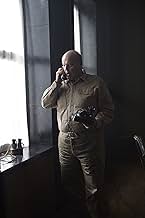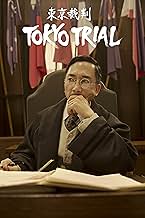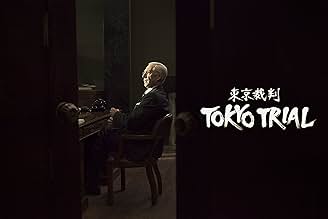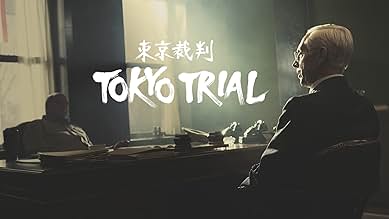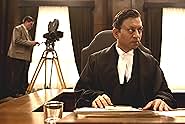Tokyo Trial
- Mini serie TV
- 2016
- 50min
VALUTAZIONE IMDb
7,3/10
2061
LA TUA VALUTAZIONE
Aggiungi una trama nella tua linguaA historical drama that focuses on a decade-long investigation into events in the Pacific during and after WWII.A historical drama that focuses on a decade-long investigation into events in the Pacific during and after WWII.A historical drama that focuses on a decade-long investigation into events in the Pacific during and after WWII.
- Premi
- 1 vittoria e 1 candidatura in totale
Sfoglia gli episodi
Recensioni in evidenza
This is one of the finest courtroom dramas after 12 Angry Men. There is never over the top sentimental (or) emotional narrative despite the subject taken is highly sensitive. This is exactly how judges go about and come to their conclusion inspite of political interference. Fanstically made series based on true history!! Must watch for every Management aspirants!
This is a fascinating, well made four-part miniseries. I watched it on Netflix over four days, but it's so good, I can see how one might want to binge watch it. It reminded me of Twelve Angry Men.
In 1946, eleven Allied Judges were appointed to The International Military Tribunal for the Far East (IMTFE), aka Tokyo Trial or Tokyo War Crimes Tribunal. Their job was to try twenty-eight Japanese leaders for conventional war crimes and crimes against humanity. I didn't know anything about this trial.
The participating countries were: Australia, Canada, China, France, British India, the Netherlands, New Zealand, the Philippines, the Soviet Union, the United Kingdom, and the United States. Later a twelfth judge from India was added. These dedicated, but very different men, (yep, all men in those days), had legal and moral clashes with regards to how to stay true to the law, remain impartial, and prevent similar atrocities.
This tribunal would form the foundation of how "war as a crime by individuals" would be judged in the future. It had previously existed only part of the Paris Peace Pact of 1928. They ran into a problem with war crimes being ascribed only to a Nation and not to an individual.
There is infighting, cliques, power struggles, and schisms amongst the judges. Pal and Röling are outspoken in their dissent, which created an interesting narrative. Röling is the main protagonist; we get a glimpse into his creative relationship with German pianist Eta Harich-Schneider.
Many of the accused were found guilty, including former Prime Minister Hideki Tojo.
I listed the judges to keep track of them.
In 1946, eleven Allied Judges were appointed to The International Military Tribunal for the Far East (IMTFE), aka Tokyo Trial or Tokyo War Crimes Tribunal. Their job was to try twenty-eight Japanese leaders for conventional war crimes and crimes against humanity. I didn't know anything about this trial.
The participating countries were: Australia, Canada, China, France, British India, the Netherlands, New Zealand, the Philippines, the Soviet Union, the United Kingdom, and the United States. Later a twelfth judge from India was added. These dedicated, but very different men, (yep, all men in those days), had legal and moral clashes with regards to how to stay true to the law, remain impartial, and prevent similar atrocities.
This tribunal would form the foundation of how "war as a crime by individuals" would be judged in the future. It had previously existed only part of the Paris Peace Pact of 1928. They ran into a problem with war crimes being ascribed only to a Nation and not to an individual.
There is infighting, cliques, power struggles, and schisms amongst the judges. Pal and Röling are outspoken in their dissent, which created an interesting narrative. Röling is the main protagonist; we get a glimpse into his creative relationship with German pianist Eta Harich-Schneider.
Many of the accused were found guilty, including former Prime Minister Hideki Tojo.
I listed the judges to keep track of them.
- Tim Ahern as Major General Myron C. Cramer (United States)
- Paul Freeman as The Honourable Lord William D. Patrick (United Kingdom)
- Serge Hazanavicius as Henri Bernard (France)
- Marcel Hensema as Professor Bert V.A. Röling (Netherlands)
- Jonathan Hyde as President Sir William Webb (Australia)
- Irrfan Khan as Radhabinod Pal (India)
- Stephen McHattie as Edward Stuart McDougall (Canada)
- David Tse as Mei Ju-ao (China)
- Julian Wadham as Sir Erima H. Northcroft (New Zealand)
- Bert Matias as Colonel Delfín Jaranilla (Philippines)
- Kestutis Stasys Jakstas as Major General I.M. Zaryanov (Soviet Union)
- William Hope as John P. Higgins (United States)
I was in the United States Army, 1st Cav Division 8th Cav Regt. stationed in Tokyo when this trial was going on. I spent a lot of time with one of the defense attorneys. I attended the trial when I could. One of my interests while I was in Japan (for one and a half years) was to learn as much as i could about the war and the Japanese people. This series was very interesting to me, as it was seen through others eves, not just mine. The scenes of the city were not what I saw, and the General Mac Arthur character did not match up with the real General, who i saw many times. The Imperial Hotel sets brought me back to my first week in Tokyo, as one of my first stops in Tokyo was to visit Frank Lloyd Wright's Masterpiece, The Imperial Hotel.
To tell a story as complex as this one was, would take as many years as the trial took and in the end, I am sure we would not know or understand what actually happened and who was at fault. We do know that the Japanese lost the war but in the long run Japan was given a new start and the people of Japan were smart enough to make the most of it.
A great series , a must for historians and legal professionals and of course students and general public. Discussion of judges in their chamber, over different legal principles and appreciation and marshalling of evidence. As a judge I found this series excellent. Irfan Khan as Justice Radhabinod Pal incomparable. He adhered to the principles of criminal law and we saw the way of tribunal as they delivered judgement in th majority of 14 to one ,The line dissenter is yes Justice Radhabinod Pal.
This miniseries starts off a little clunky, but any faults of the first episode, are forgotten by the end of the second episode. If it wasn't for one of the other reviewers who abandoned the series after watching just one episode, I would not have made this remark.
The series attempts to present the personalities and professional conduct of each Justice appointed to conduct the trails. It is not revisionist as some of the other reviewers have stated. We have had decades of documentaries about Japan's involvement in WW2, but none have attempted to cover the due judicial process to the extent of Tokyo Trial. And I think I would not have enjoyed the series if it was not dramatised, as I would have turned off to another narrated documentary.
For performances of the actors, the editing, and production are all good, especially from the end of the second episode. There is a lot to take in, I found myself enthralled by the story, and unexpectedly quite emotional at the end. I have worked on translation projects for academic material, related to this subject, but Tokyo Trial has a richer more human story to tell.
The series attempts to present the personalities and professional conduct of each Justice appointed to conduct the trails. It is not revisionist as some of the other reviewers have stated. We have had decades of documentaries about Japan's involvement in WW2, but none have attempted to cover the due judicial process to the extent of Tokyo Trial. And I think I would not have enjoyed the series if it was not dramatised, as I would have turned off to another narrated documentary.
For performances of the actors, the editing, and production are all good, especially from the end of the second episode. There is a lot to take in, I found myself enthralled by the story, and unexpectedly quite emotional at the end. I have worked on translation projects for academic material, related to this subject, but Tokyo Trial has a richer more human story to tell.
Lo sapevi?
- QuizAll the furniture in the courtroom, hotel and restaurant sets were custom-built replicas made by the art and construction departments for use on the production in order for everything to look authentic.
- BlooperMajor General Cramer, Judge Advocate General (JAG) of the United States Army, is wearing the Corps of Engineers branch insignia instead of the JAG branch insignia.
- ConnessioniEdited into Tokyo Trial (2017)
I più visti
Accedi per valutare e creare un elenco di titoli salvati per ottenere consigli personalizzati
- How many seasons does Tokyo Trial have?Powered by Alexa
Dettagli
- Data di uscita
- Paesi di origine
- Sito ufficiale
- Lingue
- Celebre anche come
- Токийский процесс
- Luoghi delle riprese
- Didziasalis, Ignalina District Municipality, Lituania(Post War Tokyo)
- Aziende produttrici
- Vedi altri crediti dell’azienda su IMDbPro
Contribuisci a questa pagina
Suggerisci una modifica o aggiungi i contenuti mancanti


